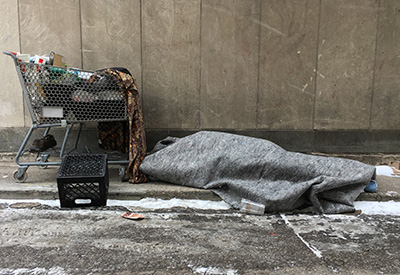It is not a secret nor debatable that Portland and surrounding cities have an ever-expanding population of houseless. There are statistics, theories, and guesses as to why this is true, and what factors lead people to become houseless. The reality is they are here, they need help, and the communities in which they sit need relief from the accumulating trash that becomes a byproduct of houseless camps.
The City of Roses Disposal & Recycling (COR) Division of Community Restoration has signed on to help combat the problem. On a nuts and bolts basis, we will be cleaning up the mess left behind when illegal homeless camps are disbanded, but our work goes beyond the physical. Since it opened its doors, COR has been dedicated to finding means to build equality in our communities based on the truth that until every person has a roof over their head, equal access to educational opportunities, and better mental health care, our problems will persist.
 And they are. The Oregon Community Foundation commissioned a study by ECONorthwest that found Oregon has a disproportionately large population of homeless people, representing 2.6% of the total homeless population across the U.S. The problem is driven in part by a lack of housing and skyrocketing rents, but there are also chronically homeless, at last count 4,339 people, who need intensive social services and more specialized housing that are helping push the state into a houseless crisis. The U.S. Interagency Council on Homelessness reports that our state has a total homeless population of 14,655 including 825 families.
And they are. The Oregon Community Foundation commissioned a study by ECONorthwest that found Oregon has a disproportionately large population of homeless people, representing 2.6% of the total homeless population across the U.S. The problem is driven in part by a lack of housing and skyrocketing rents, but there are also chronically homeless, at last count 4,339 people, who need intensive social services and more specialized housing that are helping push the state into a houseless crisis. The U.S. Interagency Council on Homelessness reports that our state has a total homeless population of 14,655 including 825 families.
It is unacceptable to live in a society where humans live on sidewalks. If cities are to grow and prosper they need to address the weakest link, which for Portland and surrounding cities is the houseless. For this reason, COR opened its Division of Community Restoration about three months ago to be part of the solution. Along with clean-up, we will be a conduit between the houseless population and the numerous agencies and organizations that can help them, such as TPI, Outside In, Portland Street Medicine, and the Union Gospel Mission. Our Crisis Prevention and Intervention Specialist will meet with the houseless to determine their needs, provide information on available services, and encourage safer alternatives to living on the street.
The cities will conduct risk assessments at homeless sites and for those areas most in need, our team will post a 72-hour notice that we will be arriving to clear the area and offer assistance. So many of the camps that have popped up are in public areas that are environmentally sensitive or are in right-of-ways where the accumulation of human traffic and waste impedes public access. There must be a balance between the needs of the homeless and the communities.
 We will go to the camps to offer assistance to anyone remaining, recycle what we can at our Material Recovery Facility, inventory the personal items we encounter to distribute back to the owners, and dispose of what remains. As we find personal items, we will take photos, bag the items and tag them with date and location, and then take the bags to a storage center. We will leave behind contact information so anyone returning to find their things gone, will know how to pick them up or have them delivered. We do this with the understanding we are not simply removing trash, but upending people’s lives, and respect for their humanity is a critical part of the process.
We will go to the camps to offer assistance to anyone remaining, recycle what we can at our Material Recovery Facility, inventory the personal items we encounter to distribute back to the owners, and dispose of what remains. As we find personal items, we will take photos, bag the items and tag them with date and location, and then take the bags to a storage center. We will leave behind contact information so anyone returning to find their things gone, will know how to pick them up or have them delivered. We do this with the understanding we are not simply removing trash, but upending people’s lives, and respect for their humanity is a critical part of the process.
Taking on illegal camping clean-up contracts is COR’s entry into operating within this space where we hope to join our efforts with those of cities, public agencies, property owners, and the houseless themselves, to shift the entire ecosystem and help people live in more humane conditions. We believe if we bring the entire community together and treat our houseless with compassion and sincerity we can gain trust and make it easier to find solutions and help those most vulnerable. If you’d like to learn more about our efforts contact us.